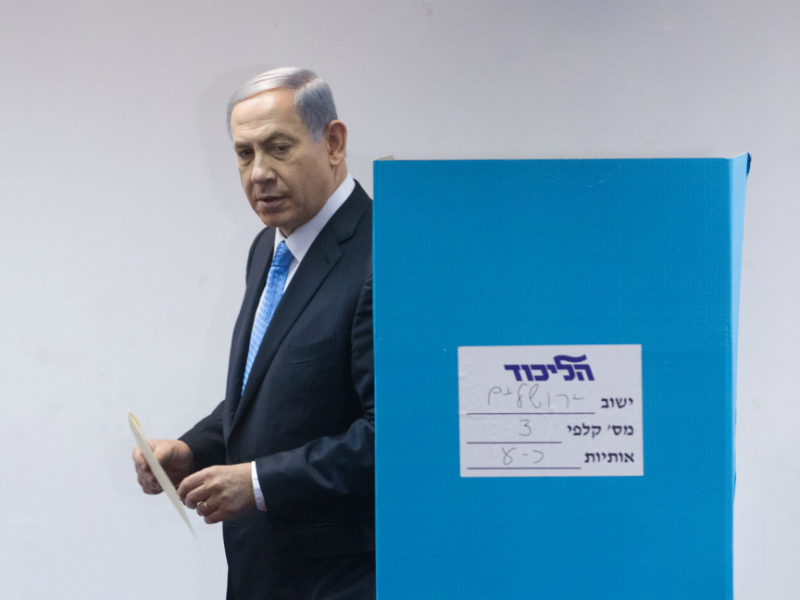Late last week, Israeli politician Avigdor Lieberman announced that his party, Yisrael Beiteinu, would neither join a right-wing government nor a national unity coalition causing the Knesset to miss the deadline on Wednesday night to form a new coalition.As a result, Israel will hold its third election in a year in early March. Voters and politicians across the political spectrum responded to the news with a collective groan since the political landscape barely changed between the first and the second election, and few expect a third to make much of a difference.
The barrier to forming a coalition is not entirely Lieberman’s making. While Yisrael Beiteinu could join the Likud and other hawkish and religious party allies to re-establish a government similar to the one that governed from 2015 until December 2018 (when the cycle of never-ending elections began), the two largest parties in the Knesset, Blue & White and the Likud, could form a national unity government without Lieberman’s party. The main obstacle to any national unity government is that incumbent Prime Minister Benjamin Netanyahu insists on remaining in office. Since Netanyahu is formally under indictment on corruption-related charges, he is not legally allowed to serve in any other capacity in the cabinet. This leaves little room for the Likud to compromise with Blue & White, a party with few policy differences with the Likud except its leadership’s determination to end Netanyahu’s reign.
Pundits and voters began to anticipate a third election after Blue & White’s leader, Benny Gantz, vainly tried to form a government without Lieberman or Netanyahu. Netanyahu had already failed to persuade his ultra-Orthodox party allies to agree to terms with Lieberman that would allow Netanyahu to extend his tenure at the helm of a narrow right government. The last couple of weeks featured more efforts by Lieberman, Netanyahu and Gantz to avoid being blamed by the public for failing to form a coalition than serious efforts to coalesce. Netanyahu’s last minute offer to Gantz and Lieberman was to give up his demand for immunity in exchange for joining a new government under his leadership. Neither Gantz nor Lieberman accepted that offer, but Lieberman came out in favour of pardoning Netanyahu in exchange for Netanyahu’s resignation.
Supporters of each leader blame the others for the impasse, so a third election is unlikely to change much. Neither the dovish left bloc nor the nationalist right bloc commands a majority of the vote without Lieberman’s base of secular immigrants from the former Soviet Union who share the right’s hawkish views but the left’s dislike of religious encroachment advocated by Netanyahu’s religious party allies. Polls consistently show that few voters expect to change their votes when they get a third opportunity to take a day off and cast ballots on the way to the beach. This is not new: few Israeli voters have moved between the dovish left and the national right blocs for several election cycles. Even history-marking indictments against a sitting prime minister have had little impact since many voters on the right buy into Netanyahu’s defence that the charges against him are politically motivated and are not serious offences.
After serving in power for a nearly a dozen years, it is hard for many Israelis on the right to imagine a government led by someone other than Netanyahu. However, before a third election, Netanyahu will face a primary election challenge from Likud rival Gideon Saar. At the moment, Netanyahu leads Saar by a wide margin, but the contest could damage Netanyahu since Saar explicitly blames Netanyahu for failing to form a government. Alternatively, Saar’s challenge may cause Likud supporters to realize that any leader of the Likud other than Netanyahu will likely lead the next government. Polls indicate that Saar (or another Likud leader) will probably cause the Likud to lose a few seats to other parties on the right, but not change the balance between the blocs. News that a cousin and several aides to Netanyahu face indictments on yet another big corruption scandal involving the government’s purchase of new submarines may not help Netanyahu retain Likud’s support once they realize the alternative to Netanyahu is most likely in their party already.
With someone else leading the Likud, a national unity coalition is the most likely path out of the impasse. A poll last week published by the Yisrael Hayom newspaper indicated that such a coalition was favoured by a majority of Israeli voters over more narrowly right- or left- options. Consequently, the biggest question is whether Likud supporters will take that path without their longtime prime minister.
With few voters jumping between blocs, some pundits expect that many Israelis will go to the polls to answer a straightforward question of whether the next government will be led by Gantz, or whomever is leading the Likud, causing parties on their respective flanks to worry about falling below the threshold for representation. Consequently, the Israeli political landscape will change. Parties on the left mull joining forces with Blue and White, or the Joint List formed by predominantly Arab parties, while parties on the right debate merging with the far right Otzma Yehudit [Jewish Power] party like they did in April, or run alone like in September when Otzma supporters wasted about 2 per cent of the total vote. These mergers, though, will likely only allow each bloc to retain their support and continue Israel’s governing impasse until Lieberman picks a side, or the parties can figure out a way to form the first government in over a decade without Netanyahu as prime minister.
